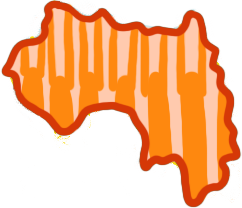Text
In "Greetings" and "Greetings Extended", I covered aspects of how to greet people in Maninka. Great, now you can get into a conversation! But how do you get out of it?
In this chapter, we're gonna cover a few things about saying goodbye in Maninka:
- a single expression to say goodbye
- how to say the equivalent of "See you [...]"
- benedictions
- how to respond to benedictions
- how benedictions can fit into greetings
Goodbye: "An bɛn"
There's a range of ways that one can "take leave" in Maninka. The simplest way is a single expression that functions similarly to "Bye!" in English.
That expression is:
An bɛn
(NOTE: You don't pronounce the n on the end of bɛn as a full letter. In Maninka, an n that follows a vowel just marks what is called "nasalization." You let the air of your breath pass through your nose instead of your mouth. English doesn't have any good examples, but you can hear how nasalization works if you compare the French words bon ('good') and beau ('beautiful'). Yes, they are spelled differently, but, the two word's sounds are exact same except that bon is nasalized.)
Using An bɛn is as simple as that; you simply say it whenever it's time to go and your friend will respond back with the same:
– Ayiwa! An bɛn!
– An bɛn, Adama!– Alright! Goodbye!
– Bye, Adama!
So in short, we can say that An bɛn means 'goodbye'. That's a good simple one-to-one translation, but what does it actually mean?
In reality, the expression An bɛn comes from a fuller expression that includes another word and has a different literal translation:
Ala ye an bɛn
'May God unite us'
There are three words that we can easily translate in this expression:
Ala: Godan: we; usbɛn: unite; bring together
Put together with the grammatical word ka, we have a single expression that means something like:
Ala + ye + an + bɛn
God +ye+ us + bring.together'May God bring us together'
In general, people almost always use the shortened form An bɛn.
(NOTE: In Bambara, the equivalent expression is K'an bɛn, which comes from the fuller expression Ala ka an bɛn. Thus, in Maninka, benedictions use the word ye and in Bambara, they use ka.)
► See you "___"
Because of its literal meaning, you can also use An bɛn as the basis for something equivalent to "See you [...]" in English. All you have to do is add a specific time word after An bɛn. For instance:
An bɛn sinin
'See you tomorrow'
The underlying pattern therefore is An bɛn + [...]. Some other helpful words and expressions that work well here are:
kɔfɛ/kɔ la= later; afterwardssɔɔma= in the morning
You may also hear this with expressionsɔɔmada la('in the morning time')tele dɔ= in the daytime
You may also hear this with the expressiontele fɛ('during the day')wura la= in the afternoon/early evening
You may also hear this with expressionwura fɛ('during the afternoon')su dɔ= at night
You may also hear this with the expressionsu fɛ('during the evening')
(NOTE: Remember, that r and d can vary, so you may hear expressions like tele dɔ as [tele rɔ]. In "Situatives", you'll learn more about the words like dɔ and fɛ that appear in the above expressions. )
Benedictions
While you can drop a simple An bɛn when it is time to hit the road, in many circumstances, you'll hear people engaging in a back-and-forth exchange of benedictions as part of the act of taking leave.
By "benediction" (duwau in Maninka), I mean sentences where someone asks God to make things be a certain way. This might seem odd to many Westerners who don't often invoke God as part as part of everyday goodbyes, but it is part and parcel of things in Maninka.
(NOTE: For the word duwau, you might also see or hear other variants like dugawu or duba. There are a lot of spellings and pronunciations because it's a loanword from Arabic originally. But they all mean 'benediction'!)
As we saw with An bɛn, benedictions can appear in either a full form or a truncated form.
There's essentially an infinite number of benedictions that one might hear or use depending on the context so we're not going to look at a lot of specific ones here. Instead we're gonna cover what you need to know to recognize something as a benediction.
The full form includes the word Ala 'God'. For example:
Ala ye tele nɔɔya!
'May God make the day easy!
(NOTE: In Maninka, there is often no "velar consonant" [that is, a g or k and similar sounds like x] between two vowels [e.g., ka nɔɔya 'to ease'], but in Bambara, it is written, and some spoken varieties of Maninka, you will here it [e.g., ka nɔgɔya 'to ease'].)
In the truncated form, the word Ala or 'God' is implied. In such cases, the benediction starts with Ka. For instance:
Ka tele nɔɔya!
'May (God) make the day easy!'
(NOTE: This use of ka is also present in Bambara benedictions whether they are full [e.g., Ala ka tile nɔgɔya, which would be Ala ye tele nɔɔya in Maninka] or truncated [e.g., Ka tile nɔgɔya!].)
You can generally use the full and the truncated forms of benedictions indiscriminately. Whether you say the explicit word Ala or not won't have any effect on the message. For instance:
Ala ye sila diya!
OR
Ka sila diya!May God make the road nice!
(Said in a context similar to "Safe travels" or "Drive safe")
Or:
Ala y'an dɛmɛn!
OR
K'an dɛmɛn!'May God help us!'
Or:
Ala ye tele hɛrɛ siyaya! OR
Ka tele hɛrɛ siyaya!'May God make the peace of the day abundant!'
Great, now you know how to recognize and say benedictions. But how do you respond to them?
Responding to Benedictions
Responding to benedictions is easy. You simply use the equivalent of "amen" which is amiina.
Each and every benediction you hear or receive should be welcomed with amiina. For instance:
– Ala ye bi diya!
– Amiina!– May God make the day pleasing!
– Amen!
Sometimes, people will pronounce multiple benedictions in a row. This means that you should be prepared to respond to each and every benediction with amiina. For instance:
– Ala y'an si!
– Amiina!
–An ye duu ɲuman gbɛ!
– Amiina!– May God make us pass the night!
– Amen!
– May God make the day rise well!
– Amen!
Other times, benedictions and "amens" fly back and forth between people. For instance:
– Ala ye su hɛrɛ siyaya!
– Amiina! Ala y'an si!
– Amiina! K'an kelen-kelen wili!
– Amiina! An bɛn!
– An bɛn!– May God make the night's peace abundant!
– Amen! May God make us pass the night!
– Amen! May God make us rise one-by-one!
– Amen! "Bye!"
– "Bye!"
What's important at the beginner stage is not necessarily understanding or catching the precise meaning of every benediction. Instead, it's to be able to recognize benedictions (An ye ... or Ka ...) and be able to respond fluidly with amiina.
(NOTE: During benediction exchanges, amiina often gets said in a few different ways: truncated, ami(n); repeated amin-amin-amin; or with other words tacked on amiina yaarabi [which comes from the Arabic 'Amen, my Lord'])
Once you get the hang of that, you'll be able to participate in the ritual exchange of benedictions by offering your own benedictions in between those of your interlocutor.
The easiest one for this is the all-purpose benediction response An ye duwau mina ('May God fulfill your benediction'). For instance:
– An ye bi diya!
– Amiina! An ye duwau mina!
– Amiina!– May God make today pleasing!
– Amen! May God fulfill your benediction!
– Amen!
(NOTE: You may also see or hear the verb k'à mina [lit. 'to grab/grasp something'] as k'à mida with a d. This is just a regional variation.)
► Benedictions as part of greetings
While benedictions are perhaps most often exchanged at the end of a conversation, they can also be mixed in as part of initial greetings. That is, someone could greet you "Goodday" and, at the same time, wish you a nice day. For instance:
– I ni sɔɔma!
– Nba! Tana ma si?
– Tana si tɛ! Ala ye bi diya!
– Amiina!– Good morning!
– Nba! Did you pass the night in peace?
– Peace! May God make the day pleasing!
– Amen!
► "Say hello to so-and-so!'"
Along with benedictions and the expression An bɛn, another frequent part of saying goodbye in Maninka is asking and accepting to greet other people.
There a few variations in how one can do this, but there are two essential parts.
(NOTE: Remember! Don't worry about the meaning of all the pieces of the expressions for now. You'll begin to understand the details when we look at verbs in later chapters. Being comfortable with the ritual of saying and responding fluidly is what is most important at this stage.)
- Request
Ko an ye [...] fola('Say that we greet [...]')Even though this expression usesan('we'), it works perfectly well even if you are saying it as a lone person. The idea is that you are requesting the greeting on behalf of a larger entourage of people such as your family, courtyard, friends, etc. (Though you can also switch out the pronoun tonif you would like.)I di [...] fo n ye('You greet [...] for for me' [as in, "You go ahead and greet so-and-so for me"]) - 'Response
[...] di à mɛn('[...] will hear it')For the response you will need to adjust the pronoun based off who someone requests that you greet. For instance, if someone asks you to greetdenbaya(that is, your family), you will need to useàlu('they'), but if they request that you greeti teri('your friend'), you will need to useà.
Together, these two parts form a single ritual that figures into the broader ritual of saying goodbye. For instance:
– Ala ye wura nɔɔya!
– Amiina!
– Ko an ye àlu fola!
– Àlu d'à mɛn!
– An bɛn!
– An bɛn!– May God ease the evening!
– Amen!
– Say that we greet them [that is, the people where you are going, at home, etc.]!
– They will hear it [that is, your greeting]!
– Bye!
– Bye!
(NOTE: The expressions Ko an ye [...] fola and [...] di à mɛn may often sound or be written "contracted" when spoken: e.g., K'an y'àlu fola! , U d'à mɛn!)
Summary
Ayiwa! Here's what we covered:
- A simple way of saying goodbye:
An bɛn!which literally comes from a fuller expressionAla ye an bɛnthat means 'May God bring us together'
- How to recognize benedictions:
- They always start with:
An yeor the shorter formKawhere the word for God is implied.
- They always start with:
- How to respond to benedictions:
Amiina(or its spoken variantsami(n),amin-amin-amin, andamiina yaarabi) which means 'amen'- The all-purpose benediction follow-up
Ala ye duwau mida
- How benedictions can be part of initial greetings
- How to request and accept to greet others for someone using
Ko an ye X fola, etc.
Vocab
Coming soon n'Ala sɔnna!
- An bɛn!
- Goodbye!
- K'an bɛn!
- Goodbye! [possible Bambara variant]
- An bɛn [...]
- See you [...] (Lit. "May God unite us [...]")
- kɔfɛ
- later; afterwards [one word]
- kɔ la
- later; afterwards [two words]
- sinin
- tomorrow
- bi
- today
- An bɛn dɔɔnin
- See you in a bit
- An bɛn sɔɔma!
- See you in the morning!
- An bɛn tele dɔ!
- See you in the midday!
- An bɛn wura la!
- See you in the afternoon!
- An bɛn su dɔ!
- See you in the evening!
- Ala ye ...
- May (God) ...
- Ka ...
- (May God) ...
- Ala ye tele/su hɛrɛ siyaya!
- Have a nice day/night! (lit. "May God make the day/night's peace abundant)
- Ka wura nɔɔya!
- May God make the afternoon easy!
- Ala y'an si!
- May God have us pass the night!
- Ka su kayira!
- May God make the night peaceful!
- K'an kelen kelen kunun/wili!
- "May we wake/rise one-by-one!" [as opposed to all at once when there's an emergency]
- Ka duu ɲuman gbɛ!
- "May the day break peacefully!" (as in, 'May we have a good night!')
- amiina
- amen
- duwau/dugawu/duga/duba
- benediction; blessing
- Ala ye duwau mina/mida!
- May God fulfill the benediction!
- Ala ye sila diya!
- "Safe travels!" ('May God make the road pleasing')
- Ala ye lɔɔ diya!
- "Have a nice market!" ('May God make the market pleasing')
- Ala ye bi diya!
- "May God make today pleasing!"
- Ko an ye X fola!
- Say that we greet X!
- I ye X fola n ye!
- Greet X for me!
- X di à mɛn
- X will hear it
- Ala ye nɔɔya kɛ!
- Feel better / Get well soon (lit. 'May God do easing') [When someone is sick]
- Ala y'i sɔn!
- May God provide for you! [Said to a beggar to wish them well]
- Ala ye den balo!
- May God nourish the child! [Said especially to someone with a newborn or young child]
- Ala y'à kɛ fudu di!
- May God make it a marriage! [Said to wish someone a happy marriage]
- Ala y'i sada!
- May God repay you! [Said to thank someone for a good deed]
Vocab list will be here someday!
Flashcards will be here someday!
Exercises
Exercises will be here someday!




